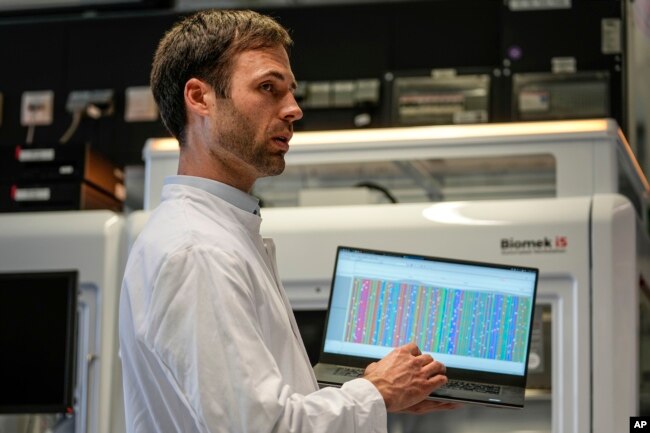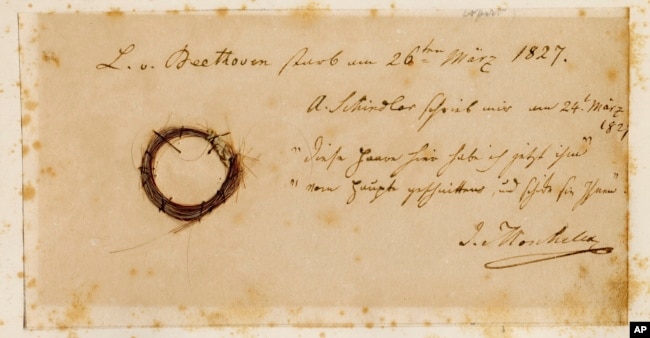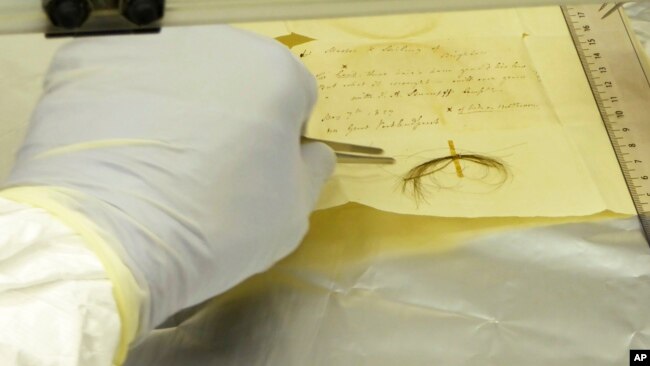ベートーヴェンのDNAから分かること
家康や信長、アインシュタインなど、DNA解析で知りたいですね〜。
EUデータ保護指令、英国データ保護法、フランスの情報処理、米国のHIPAA(Health Insurance Portability and Accountability Act)プライバシー規則情報ファイル及 び自由に関する法律 などありますが、どれも遺伝情報は個人情報に該当するかは明示されていません。(2015年での情報)
気になるところです。
VOAで英語を学びましょう!!
ベートーヴェンのDNAから、彼の健康状態に関する詳細が判明(和訳)
DNA from Beethoven Provides Details about His Health
March 24, 2023
ドイツの有名な作曲家ルートヴィヒ・ヴァン・ベートーヴェンのDNAを調査した研究者が、彼の健康状態について新たな情報を得ました。
ベートーベンの髪の毛から採取されたDNAからは、彼の難聴の原因は分かりませんでした。しかし、ベートーベンが肝臓病の遺伝的リスクを抱えていることが判明しました。また、ベートーベンが晩年、B型肝炎ウイルスに感染していた証拠も示されました。このウイルスは肝臓にダメージを与えます。
この発見は、最近、Current Biology 誌に掲載された研究結果で明らかになりました。
この発見は、ベートーベンの肝臓の問題が、彼を殺したと広く信じられている肝不全を引き起こすのに十分だったことを示唆しています。この作曲家は、肝臓に影響を与えるアルコールの大量飲用者でもあったと考えられています。
3月26日は、オーストリア・ウィーンでベートーヴェンが亡くなってから196年目の記念日です。作曲家自身は、死後、自分の健康問題を医師に研究してほしいと書いていました。
アクセル・シュミット氏は、ドイツのボン大学病院の遺伝学者で、この研究の指導にあたりました。彼はAP通信に、ベートーベンの病気は "時には彼の創造的な仕事を非常に制限することがあった "ということが立証されたと語っています。シュミット氏は、多くの医師にとって、何がベートーベンを殺したのか”常に謎であった”と付け加えています。
彼の死後、科学者たちは長い間、ベートーヴェンの病歴を整理しようとしてきました。そして、それらはベートーヴェンの健康状態について、さまざまな可能性を提示してきました。
しかし、新しい検査技術と方法によって、古代のDNAを調べることで、健康状態や死亡情報を再確認することができるようになりました。DNAサンプルは、ベートーベンの頭から切り取られた髪の束から採取されました。
ベートーベンの髪を1本ずつ洗浄した後、科学者たちはその破片を物質に入れ、少量のDNAを採取したと、この研究の著者であるトリスタン・ジェームズ・アレクサンダー・ベッグ氏は話しています。彼はこの研究の執筆者であり、ケンブリッジ大学の生物学教授です。
十分な遺伝物質を得るのは難しかったと、この研究のもう一人の執筆者であるヨハネス・クラウゼ氏は話します。彼はドイツのマックス・プランク進化人類学研究所の古遺伝学研究者です。クラウゼ氏は、髪の毛に含まれるDNAは非常に細かく切り刻まれるため、このプロセスは困難だったと語っています。
しかし、3メートル近いベートーベンの毛髪を使い切ったことで、ようやく、遺伝的疾患の兆候を検査できるゲノムをつなぎ合わせることができた、とクラウス氏は言います。
オハイオ州立大学のアブラハムZ.クーパー博士は、ベートーベンの難聴の原因は何だったのか、まだ解明されていないと語っています。彼はこの研究には関与していません。クーパー氏は、遺伝は私たちの健康を構成する”血筋と環境”の要素の半分しか示せないので、その謎は永遠に続くかもしれないと述べます。
しかし、クーパー氏は、その謎がベートーヴェンの面白さや人気の理由の一部であると付け加えています: 「わからない ということは、それでいいと思うんです」と彼は言います。
DNA from Beethoven Provides Details about His Health
Researchers who examined DNA from famous German composer Ludwig van Beethoven have learned new details about his health.
The DNA – which came from Beethoven’s hair – did not provide a cause for his deafness. But the samples did find that he had a genetic risk for liver disease. The DNA also showed evidence that Beethoven was infected with the virus hepatitis B in the last months of his life. The virus damages the liver.
The findings recently appeared in a study in the publication Current Biology.
The findings suggest Beethoven’s liver issues were enough to cause the liver failure widely believed to have killed him. The composer was also believed to have been a heavy drinker of alcohol, which can affect the liver.
March 26 is the 196th anniversary of Beethoven’s death in Vienna, Austria. The composer himself wrote that he wanted doctors to study his health problems after he died.
Axel Schmidt is a geneticist at Germany’s University Hospital Bonn who helped lead the research. He told The Associated Press it is established that Beethoven’s sicknesses had “sometimes very much limited his creative work.” Schmidt added that for many doctors, “it has always been a mystery” what exactly killed him.
Since his death, scientists have long tried to piece together Beethoven's medical history. And they have offered a series of possible explanations for his many health conditions.
But new examination technology and methods now make it possible to revisit health and death information by studying ancient DNA. The DNA samples were collected from locks of hair that had been cut from Beethoven’s head.
After cleaning Beethoven's hair one piece at a time, scientists put the pieces into a substance and collected small amounts of DNA, said study author Tristan James Alexander Begg. He was a writer of the study and is a biology professor at the University of Cambridge.
Getting enough genetic material was difficult, said another writer of the study, Johannes Krause. He is a paleogeneticist at Germany’s Max Planck Institute for Evolutionary Anthropology. Krause said the process was difficult because DNA in hair gets cut up into very small pieces.
But finally, after using up almost 3 meters of Beethoven’s hair, the team was able to piece together a genome that they could test for signs of genetic disease, Krause said.
The question of what caused Beethoven’s hearing loss remains unanswered, said Ohio State University's Dr. Avraham Z. Cooper. He was not involved in the study. Cooper said that mystery might continue forever because genetics can only show us half of the “nature and nurture” elements that make up our health.
However, Cooper added that the mystery is part of what makes Beethoven so interesting and popular: “I think the fact that we can’t know is OK,” he said.
Words in This Story
composer – n. someone who writes music
sample – n. a small amount of something that gives you information about the thing it was taken from
author – n. someone who writes, originates or creates something
paleogeneticist – n. a geneticist whose specialty is paleogenetics
genome – n. the complete set of genetic material of a human, animal, plant or other living thing
nurture – v. to take care of, feed and protect someone or something, especially young children or plants



